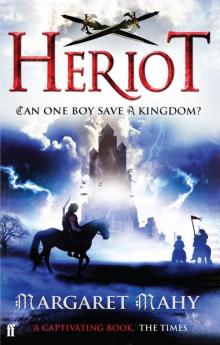- Home
- Margaret Mahy
Kaitangata Twitch Page 3
Kaitangata Twitch Read online
Page 3
‘Wear a lifejacket!’ Meredith reminded him sternly.
Rufus sighed. ‘Do I have to?’
‘Mum’ll ask,’ Meredith said, unhooking her own life-jacket from the boathouse wall.
‘Mole and Rat never wore lifejackets,’ grumbled Rufus. ‘Swallows and Amazons didn’t.’
‘Yeah, but they didn’t have mothers,’ said Meredith. ‘Well, Mole and Rat didn’t. Anyway, they were old-fashioned.’ And Rufus, who hated the thought of being old-fashioned, fell silent.
‘The mothers of the Swallows and Amazons made them a tent . . . made–them–a–tent,’ he began again, a little later, fastening his jacket and repeating the words as if a home-made tent was something he found it impossible to believe in. ‘And they made themselves a flag, and did sailing against the wind and stuff like that. But no lifejackets!’
‘All the crews in the America’s Cup race wore life-jackets,’ Meredith said, pushing herself off with the paddle. She longed to be skimming swift, silent and above all solitary across the shallow sea while the island slowly swelled before her, filling her head with strangeness. The true mysteriousness of sea and island would never come to her this morning, with Rufus shouting and splashing behind her. That mystery, like Lee Kaa’s wandering saxophone sound, belonged to solitude.
And now someone else was shouting. It was Kate this time, Kate jogging along the beach towards the boathouse, hair flopping as she ran. And Kate had let the dogs out, too. Pudding was already chest-deep in the water while Pie raced up and down the beach like a mop-head given magical life, wanting to be out there with the leaders but unwilling to swim. The lonely morning was suddenly crowded to its very edges with family life.
‘She’s mad because you’ve got the blue canoe,’ said Rufus with satisfaction. ‘Why is the blue canoe the best one?’ he asked a moment later.
Meredith found she could not quite remember why. ‘It’s just the one we all want,’ she said. ‘It’s the biggest, I suppose.’ Directly ahead of her, the island, half dream, half sea-animal, basked and waited.
The water below the dipping paddle turned a darker green. They were now over the deepest part of the channel that ran between island and mainland. But it soon grew shallow again, and at last they glided in at Shelly Beach, mud giving way to sand, then sand to shell. The canoes grated to a gritty standstill. Meredith leaped out; Rufus leaped out. Together they pulled both canoes across tidelines of sticks and thick, kelpy seaweed which smelt of salt and gleamed with occasional stars of water-washed glass. Kate was coming after them in the green canoe – the oldest one. Even from a distance, Kate looked like a princess in a fairytale . . . not a palace princess (she was too brown for that) but one who had escaped from some wicked stepmother and had been surviving with her own sort of happy richness out in the wild.
Meredith’s eyes wandered to the world above and beyond Kate’s head. She could see the roof of their own house among its trees, with the donkey paddocks to the left, and above it pieces of the road which ran behind their house before curving down around the donkey paddocks towards the beach. A sleek, scarlet Saturday car showed briefly on this curve, then disappeared behind a huge boathouse – a Cardwell boathouse, for the land on the other side of the road was all Cardwell land and even though Sebastian lived in the city and spent a lot of time over in Sydney, being a clever businessman he owned two expensive boats much newer and smarter than anything the Gallaghers could afford. (Not, as Mr Gallagher pointed out over and over again, that they would ever want noisy boats like those. The Gallaghers were yachtspeople not speedsters.) Powerlines, beautiful as spiderwebs at that hour in the morning, swung from pole to pole in huge, thin curves of light, as they swept majestically down, bringing electricity to the Cardwell boathouse.
On the upper side of the road, more Cardwell land rose, slowly at first, then rather more sharply, finally becoming bush-clad slopes that overlooked everything the Gallaghers owned. Meredith tried to imagine this hillside covered in houses, tried to imagine strangers on new balconies and verandahs, lying in recliner chairs or under bright sun-umbrellas and staring curiously down at the Gallagher barbecues or watching them struggle to file the hoofs of unwilling donkeys.
‘Let’s climb,’ she suggested, beginning to cast along the beach for the beginning of a faint, familiar track that wound to the top of the island.
‘Oh no! Not climbing!’ said Rufus, disgusted with any plan that involved inching between gorse bushes. ‘Let’s go round!’
‘I’m climbing,’ Meredith persisted, and she clambered up at (more or less) the place where only yesterday afternoon she had imagined seeing, through her birthday binoculars, something scramble and vanish.
‘Hang on,’ said Rufus, his eyes fixed on Kate in the green canoe, only a short distance now from Shelly Beach.
But Meredith, pushing between the woody legs of old gorse bushes, left the beach, her brother and her sister behind her. At last she was alone.
6
She knew just where she was going. She was following the remains of an old track. Gorse had grown so thickly around it that sometimes she had to crawl along on her hands and knees, or flatten herself to slide between tough, spiked stems which thrust fierce elbows upwards and sideways. The ground was thick with dried and fallen prickles which jabbed painfully. Even here it was hard to be completely alone. From the harbour beyond came the sound of two speeding boats, one far away and the other much closer. Someone was taking the advantage of a full tide to skim scornfully around Kaitangata, disturbing the echoes and the crabs.
Meredith came to a place where she could stand up, but walking was still not easy. She climbed in a this-way that-way dance of small tortures . . . turned right, drew in her stomach, spun left quickly, offering as little of her skin to the gorse as she could. Even the soft new growth stung her legs and forearms; sometimes she pinched it aside, and curved herself around it, but almost always it found some way to strike at her.
Suddenly she stopped. The track in front of her tumbled into a gaping hole – a cave-in or underrunner. Meredith couldn’t help thinking it was like a new mouth the island had opened at her. She edged around it as if the island might really try to snap her up.
Coming out of the last of the gorse was like coming from one world into another. Here she was free, under a wide sky. Meredith suddenly felt she had become God’s eye, taking in the hillsides, the bright wink of Trident Cove, and the way the bay opened its arms widely towards the open sea, as if to embrace it and become true ocean at last. Maybe that’s what it really wants, Meredith thought. Maybe it longs to be true ocean.
‘Once upon a time . . .’ she began, speaking aloud, and then fell silent. Just being here was a story beyond words.
A great rock had partly broken through the soil almost at her feet. She stepped onto it, then onto another and then another. Wild thrift, its buds stained bright pink and purple, pushed out of cracks so bare of soil that the plants seemed to be growing from the rock itself. There were foxgloves too, mostly past their best, with only a few bells left at the top of inclining stems. And then it was nothing but rocks and thrift. Meredith had reached the very top of the island. Now only the rocks were higher than she was, and rocks could be climbed.
Using handholds her father had once shown her, Meredith pulled herself towards the hollow where she planned to sit and stare. But as her eyes came level with that secret sitting place, she froze. Someone had been there before her. Someone had left her – what? A message? A clue?
In the hollow lay a bunch of flowers – not the sort of flowers that Meredith might have gathered herself, wandering around the island, not thrift and foxgloves, clover and grass-heads tied together with a thread of flax. This bunch could only be called a bouquet. In it were rosebuds just opening, love-in-a-mist (huge blue single eyes fringed with sparse green lashes), delicate white sprays and strangest of all, freesias, even though freesias in all bay gardens had stopped flowering weeks and weeks ago. The bouquet was carefully held in place
by a paper frill and tied with white ribbons.
Meredith put out a hand – then drew it back, finding she could not bear to touch this lure. Something about it suggested danger.
Moving very slowly, Meredith stepped backwards and downwards, her feet finding the places they knew to be there. Halfway down, since she could not bear to go slowly any more, she simply let go with both feet and hands, and leaped backwards to the ground, staggering as she landed, scraping her leg on a rock, and falling forward at last on her hands and knees. One of the scrapes was deep enough to bleed. Big drops of blood ran down on bare soil, which soaked them up quickly – sucked them up greedily, Meredith thought.
Flick! Kaitangata said to her, ‘Need! Need! Feed! Feed!’
As the blood disappeared, becoming a mere stain on the sandy soil, something stirred in the island. There was a curious sound – the whole earth creaking, rocks gritting against one another. Meredith, still on all fours and clenching her teeth against pain, felt the world under her palms and knees rise, then fall, as if Kaitangata had secretly gasped for breath . . . or for more blood, perhaps. No one could tell. It was almost like an earthquake – almost like the Kaitangata twitch – but somehow she knew that this particular twist was all in her head. Out there, drenched in Saturday sunlight, the island was really perfectly still.
Stumbling to her feet, she set off at a limping run, not towards the track she had scrambled up by, but to another, clearer path, the one that people usually used if they wanted to climb to the top of the island. It was not any earthquake-fear that hounded her. It was the thought of those flowers set down like some sort of sacrifice on the stony dimple of the island’s fist, and also the thought that somewhere, at some time, she had seen that exact bouquet before. Yet she was quite unable to remember where or when.
7
The path that Meredith was now following wound down towards the sharper eastern end of the island. She held her breath, stepping as quickly as she dared over the more crumbling pieces of the track, and then began to hear voices – Rufus, of course, somewhere down below and to her right, shouting ‘Look! Look!’, and a quiet, answering murmur, Kate’s voice. Then she heard Rufus say ‘There’s someone there already,’ in a flattened voice, as if he did not want to be heard.
Meredith burst through the trees and onto the rocks. The bay opened out in front of her like hands parting to set something free.
There was a man poised on rocks to her right. Meredith stared at him, startled, and he stared back at her.
‘Surprise, surprise!’ he said, sounding cheerful, but rather sarcastic too.
‘He’s talking to someone,’ said Rufus’s voice to her right, and then Rufus and Kate appeared.
Meredith was sure she had never actually seen this man before, yet there was something familiar about the short, springy hair curving down to a point in the centre of his forehead, and his funny, long, lopsided grin. Pie began barking and, after staring around in her usual dizzy fashion, Pudding barked too, just for the fun of making noise.
‘Hey!’ said the man. ‘None of that!’ He held out his hand to the dogs, who fell silent, suddenly obedient, and edged up to sniff him. On his little finger he wore a ring made of silver. Meredith could see it was carved in some way. Pudding stretched out her long nose cautiously and licked the fingers.
‘Attack successfully subdued,’ the man said.
‘We’re the ones who are being attacked,’ Kate replied. Meredith was astonished at the hostility in her voice. ‘You’re the one who’s ruining things around here. And it’s not even your home. It’s ours.’
‘And who are “we”?’ the man inquired. Then he looked at her sharply. His expression changed. ‘OK! Don’t bother answering. I can guess who you are.’ His eyes shifted. He looked at Rufus, then at Meredith and then at Kate again, carefully studying her golden hair and his eyes running up and down her long olive legs. ‘Just let me point out that this isn’t your land. It’s mine.’
Of course! This was the face that had been looking down from small posters on local walls and telegraph poles for the last few weeks. This was the wicked magician who had turned Old Creek into Trident Cove, Sebastian Cardwell himself.
‘We come here all the time,’ Rufus explained, sounding surprised that someone could not know this.
‘I’ll just bet you do,’ said Sebastian Cardwell. ‘And then you go home and listen to your old man saying nasty things about me. Well, you need my permission to wander around this island, so get out of here right now.’ He looked around as if he were suddenly measuring something no one else could see. ‘There must be a few millionaires out there who’d love to own a place on an island,’ he added thoughtfully.
‘Millionaires like white sand, not mud and crabs,’ muttered Meredith.
‘But you can’t actually own an island, can you?’ said Rufus, sounding genuinely incredulous. ‘Aren’t they like beaches? No one can own beaches.’
‘I think you’ll find I own this one,’ said Sebastian Cardwell levelly. ‘You’re nothing but trespassers.’
‘We don’t care,’ said Kate in a chilly voice. ‘Keep your boring little lump of grit. Come on, you kids!’
She swung round, and marched off. Meredith and Rufus followed her. Pudding and Pie dived ahead of them, as if they knew the way better than anyone else did.
‘Hey! Do tell your mother you saw me,’ Sebastian Cardwell called after them. The words were ordinary enough, the sort of thing you might write at the end of a letter, yet he seemed to give them an extra malevolent meaning. None of the children answered him. Within a few minutes they were all on Shelly Beach and making for their canoes.
8
‘I absolutely, utterly hate that man,’ said Kate, coming to a stop so suddenly that Meredith cannoned into her back and Rufus almost ran into Meredith’s. ‘I didn’t like him before, but now I’ve met him I utterly hate him.’
‘He wasn’t as nasty as I thought he’d be, though,’ said Rufus, sounding puzzled. ‘He looked as if he enjoyed laughing! Boy, did you see that ring he was wearing? It was carved with two hands holding one another.’
‘Dad’s right,’ said Kate fiercely. ‘That man doesn’t care about—’ She waved her hand at the path ahead of them.
‘He doesn’t care about gorse?’ said Rufus. ‘Oh wow! Send for Batman!’
Kate glared at him.
‘He could just ruin our home,’ she cried. ‘He could wipe out everything around us. Imagine looking out of our windows and seeing nothing but huge houses and marinas and speedboats.’
‘We could look out of other windows,’ argued Rufus.
‘Our biggest, best windows look onto his land,’ said Kate. ‘And anyhow, he’ll probably cover the hills behind us with houses, too. He’s on the council now and he wants to subdivide the hills into lifestyle blocks. You know, big houses, a pony for the kids and six black sheep, so the mum can belong to the Coloured Wool Craft Group.’
‘That isn’t so bad, is it?’ asked Rufus. ‘I mean having sheep and a pony.’
‘But the hills will be changed for ever,’ cried Kate. ‘This is our home – our home’, she added, almost shouting the word at Rufus. ‘Don’t you care?’
‘But isn’t it greedy to want things to stay the same?’ persisted Rufus. ‘I mean,’ he went on, struggling to get things clear, ‘things must be – must be able to change or . . .’ His voice faded and he looked around as if the end of his sentence might be hanging somewhere in the air around him.
‘He mightn’t be able to build on Kaitangata,’ said Meredith. ‘It’s pretty crumbly. It’s always falling in on itself – sort of eating itself from inside.’ She thought of that new gaping mouth opened beside the track through the gorse.
‘He’ll find a way,’ said Kate bitterly. ‘Men like that always do. And it’s not just the island. He’ll want more.’
They scrambled into their canoes and set off home, with Pie sharing Meredith’s canoe this time, and Pudding dog-paddling after them.
As they were tugging their canoes towards the boathouse again, Lee Kaa walked past them, carrying a sack. Lee’s market garden, with its long glasshouses, was two bays further on, and he often began his Saturdays by walking all the way to the head of the bay and then back again, collecting seaweed for his compost heap.
‘Hello, you lot!’ he said. ‘Been out on the water?’
‘We’ve been over to Kaitangata,’ Meredith said.
‘You be careful, then,’ he said. He was smiling, yet it seemed to Meredith that there was an edge of real warning in his voice.
‘We were wearing lifejackets,’ shouted Rufus, pleased with the chance to point out how faultless he had been.
‘I mean be careful on Kaitangata,’ said Lee, answering Rufus but looking at Meredith. ‘It’s fifty years since Shelly Gentry disappeared, and fifty’s one of those numbers that seems as if it means something. People celebrate fifty and maybe islands do too. So watch out.’
For some reason the name Shelly Gentry brought a picture of the flowers laid secretly on the top of Kaitangata’s grey knuckle into Meredith’s mind. She drove it out again, and found herself trying to remember exactly who Shelly Gentry had been. The name somehow suggested a sort of smudgy sadness. Hadn’t there once been some accident? Some old calamity?
‘It’s the island that needs to watch out,’ Kate was saying. ‘Guess who was out there, skiting and grinning?’
Lee Kaa glanced back over his shoulder.
‘Well, judging from the fact that I saw our local Mr Big had parked his red Jag on the road back there by his boathouse, I’d say you ran into Sebastian Cardwell.’ ‘He’s talking about selling bits of Kaitangata to millionaires,’ said Kate.
‘He was just bullshitting,’ cried Rufus. ‘Millionaires don’t want islands you can almost paddle to.’

 Shock Forest and other magical stories
Shock Forest and other magical stories The Riddle of the Frozen Phantom
The Riddle of the Frozen Phantom Aliens In The Family
Aliens In The Family The Magician of Hoad
The Magician of Hoad Twenty-Four Hours
Twenty-Four Hours The Gargling Gorilla
The Gargling Gorilla Kaitangata Twitch
Kaitangata Twitch Heriot
Heriot The Changeover
The Changeover